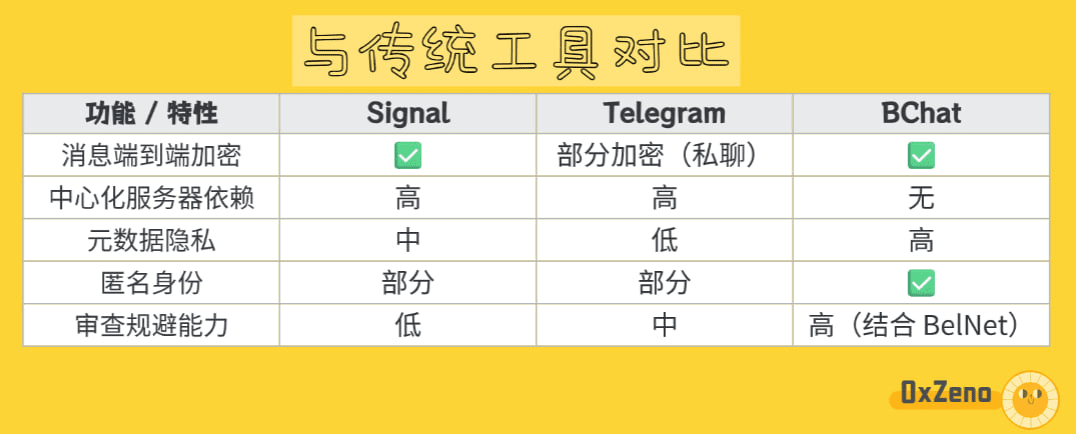📝 Hello everyone, I am 𝟏𝟎, welcome back to the #BlockchainDevelopmentHistory research series. This time we focus on BChat — an important part of the Beldex ecosystem, showcasing decentralized technology and the concept of privacy and freedom.
Are privacy chat tools really safe? Signal and Telegram are secure, but they still have risks of centralization, metadata leakage, and censorship. BChat is not just about anonymous transactions; it is trying to reshape the way we communicate.
👇👇👇
1. Why is decentralized communication needed?
The necessity of decentralized communication lies in the fact that traditional encrypted chat tools, although they encrypt content, still rely on centralized servers. This means that the server may record metadata, such as who is chatting with whom, the time and frequency of chats. Once the server is breached or subjected to government regulation and corporate cooperation, privacy may be compromised. Furthermore, in some regions, centralized platforms may be blocked or restricted, preventing users from communicating freely. Therefore, if one truly seeks privacy and freedom, it is essential to start from a decentralized network design, which is precisely what BChat does.
2. The core design and technical highlights of BChat
1. Masternode network relay
BChat does not rely on centralized servers but relays messages through the Beldex Masternode network. Messages are segmented and encrypted before sending, and forwarded through multiple hops, with each node only knowing the previous and next hops, making it impossible to reconstruct the complete communication link, thus maintaining anonymity during transmission.
From observation, this is BChat's greatest advantage: true decentralization and end-to-end privacy protection, distinguishing it from most chat software that claims to be encrypted.
2. Multi-layer encryption mechanism
BChat utilizes multi-layer encryption technology: end-to-end encryption of message content, node transmission encryption (multi-layer tunnels), and automatic updating of temporary session keys. This design not only makes messages difficult to read but also reduces the risk of intermediate nodes being compromised.
3. User anonymity and optional identity
BChat supports anonymous chatting, allowing users to use it without registering personal information, while also retaining optional identity binding features to meet different scenario needs:
Anonymous scenarios: free communication, privacy socializing; semi-real name scenarios: building trust, community interaction.
3. Application cases and scenarios
1. Privacy socializing
Users can freely join group chats or one-on-one chats without worrying about identity exposure.
2. Communication on sensitive matters
Businesses or project parties can use BChat to communicate sensitive information internally without relying on third-party servers.
3. Global free access
With BelNet, users can safely access BChat even in restricted network environments.
4. Comparison with traditional tools
For me, the biggest highlight of BChat is not the chat functionality itself, but the solution to privacy issues from the underlying network architecture, which is rare in other encrypted chat tools.

5. Conclusion
The potential of BChat lies not only in technology but also in ecological synergy. It interacts with modules like BelNet, Beldex browser, and anonymous transactions, forming a complete privacy closed loop. Users using these tools within BChat will naturally cultivate privacy awareness.
When the user base reaches a critical point, BChat can become an entry-level application for privacy socializing. If Beldex continues to optimize the experience and node stability, BChat may even become a benchmark product for Web3 privacy communication.
Privacy is not only about encryption technology but also reflects user freedom and digital sovereignty. BChat is not just a chat software; it is the core of the Beldex ecosystem and an experimental ground for decentralized communication.
The value of BChat lies not only in protecting message privacy but also in empowering each user to regain their digital freedom. I recommend everyone to personally experience BChat and then think: what does it mean for your daily life and work if your messages can never be tracked?

